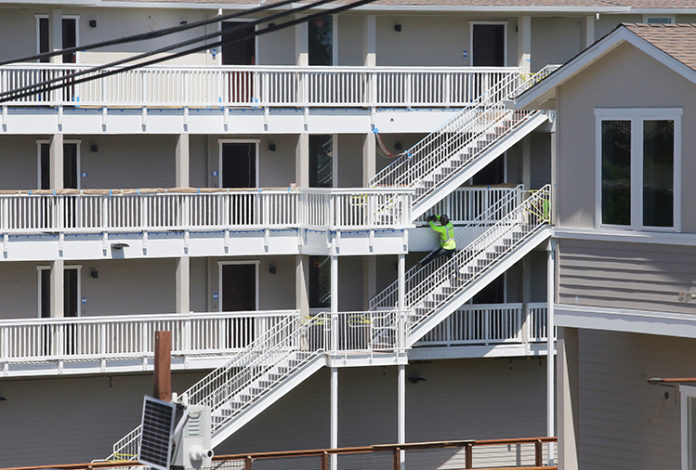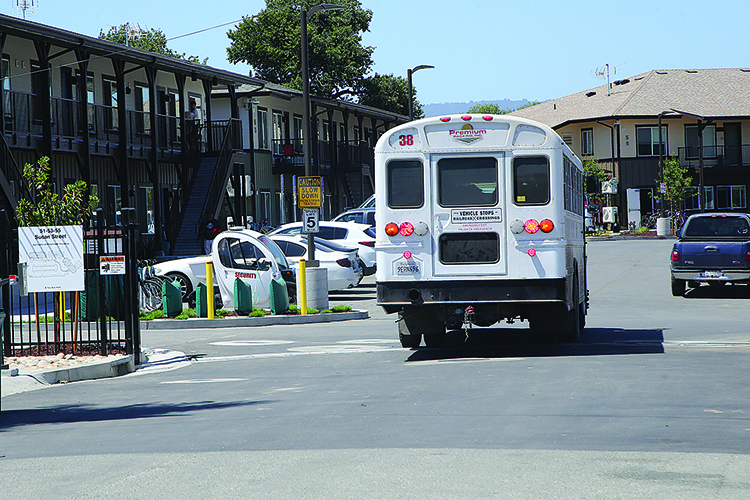
Just across the Pajaro River from Watsonville in Monterey County, hundreds of seasonal farmworkers are now living in a recently completed housing complex created for them at the end of Susan Street.
Buses take them to their job sites, and return them to the gated community, which includes three residential buildings with 45 units for 360 seasonal agricultural workers on a 3.41-acre property.
The property is owned by Rio Vista Group LLC, a Salinas-based group that includes Kevin Tottino of Ocean Mist Farms, Joseph Stratton–who at the time of development was chief of staff to former Monterey County Supervisor John Phillips, Ronnie Alderete of Premium Packing and Cesar Padilla, who owns Castroville Tire.
Developer John Avila had said that his other developments have been successfully integrated in their communities. He pointed as an example to the 100-unit Tanimura & Antle Housing project in the Town of Spreckels.
While Padilla says that things have been going smoothly and that the project has been meeting its goals since it opened two months ago, residents of the small neighborhood that includes Susan Street are not as happy.
Christine Shaw, who has lived on the road her entire life, says it also brought traffic woes to the formerly quiet neighborhood, with several buses and private vehicles carrying residents to and from work going up and down the narrow street per day.
Shaw stresses that her concerns about the development have nothing to do with farmworkers. Many of her neighbors—as well as her family members—have jobs in the agriculture industry, she says.
But she adds that the project would have been better suited on a larger thoroughfare such as San Juan Road, because the problems with traffic are much worse than they predicted, she says.
“I feel like we were the sacrificial lambs in this,” she said.
Shaw says she no longer allows her kids to walk along the road because of the traffic, and that children are no longer able to play outside.
“The traffic is worse than we could have anticipated,” she said. “This is an intensification of our neighborhood.”
Additionally, Shaw described the dust caused by the traffic as “terrible.”
Mario Medina, who has been living in the neighborhood for five decades, says the development has radically changed the area, with numerous buses coming up and down the narrow street every day. This is in addition to several vehicles—many of which exceed the speed limit—coming to pick up and drop off residents.
The problem is worse on Thursdays, when payday brings mobile check-cashing business operated out of vehicles, along with an impromptu flea market and food vendors that block residents’ driveways.
“It’s a hassle,” Medina said.

Neighbors say that the property managers have expressed little interest in what happens outside their gates, and that local law enforcement has done little to help.
A similar project—two, three-story buildings for up to 250 farmworkers on a 1.3-acre site at the end of Gonda Street—which runs parallel to Susan Street a block away, is in the works.
On April 10, the Monterey County Planning Commission deadlocked on approving that project in a 3-3 vote after Shaw, who sits on the commission, recused herself.
While that amounted to a denial, the project will go for an appeal to the Monterey County Board of Supervisors on July 9.
Property owner Anthony Nicola said the farmworker housing project will fill a critical need in the community, while a density bonus allows him to increase density on the parcel while creating three units of very-low-income housing.
He says that traffic concerns on Gonda Street are different from the other project, since Gonda Street does not allow street-side parking, giving vehicles more room to maneuver.
He also said that, because farmworkers are required to use the provided buses, traffic impacts are projected to be minimal.
“Agriculture is the biggest and most important industry in the Pajaro Valley, and the food grown here feeds so many people,” Nicola said. “At the same time, the cost of living makes it difficult to find housing for the people who work here. This Project fills that critical need.”
Meanwhile, 72 new affordable apartments by MidPen Housing at 139-141 Miles Lane in Watsonville are edging toward completion, possibly by September.
Sparrow Terrace (formerly known as Miles Lane) is a joint project between MidPen Housing and Encompass Community Services.
“This partnership aims to address the community’s pressing needs for affordable housing and expanded behavioral health services,” Their website states.
Sparrow Terrace will feature six buildings, including a community building, complemented by a lush garden-style design with green spaces and a revitalized wetlands habitat. Thirty-five of the homes will be set aside for farmworker families, and six apartments will serve formerly homeless people.
Sparrow Terrace will be geared for people with incomes of 30%-60% Area Median Income (currently $46,650-$93,300 for a family of four). Forty-three Project-Based Vouchers from the Housing Authority of Santa Cruz will deepen the affordability, allowing the development to serve residents at even lower income levels.
The property’s buildings include a community building with full kitchen and learning center, green spaces, garden boxes, a playground, and solar photovoltaic system.
MidPen Property will manage the community, and MidPen Resident Services will provide free, onsite services such as employment preparation, exercise and nutrition classes, and connections to community resources.
Plans call for 16 studio apartments, 19 one-bedroom units, 18 two-bedroom units and 19 three-bedroom units.
Built on a 4.7-acre sloping lot that has mostly sat vacant, MidPen and building contractor, L&D Construction, are constructing five three-story apartment buildings and one two-story community center with a manager’s unit. Two separate buildings will be used by Encompass as inpatient and outpatient facilities.
Rents are expected to range from $490 to $2,134.
Altogether, those buildings will total roughly 101,000 square feet.
Tarmo Hannula contributed to this story.












This article is good but poverty rate is increasing now a days and we want to meet to gather and make the planning on end of poverty
get the more detail about this……..____–.https://www.big.salary7.com/
What the article doesn’t mention is the Pajaro developments are not for local farmworkers, but for H2A visa seasonal workers, brought from Mexico for the harvest season. That’s fine, its great for Big Ag, but don’t pretend it does anything to solve our housing crisis or helps local farmworker families desperate for affordable housing. What helps local families is more projects like MidPen in Watsonville.